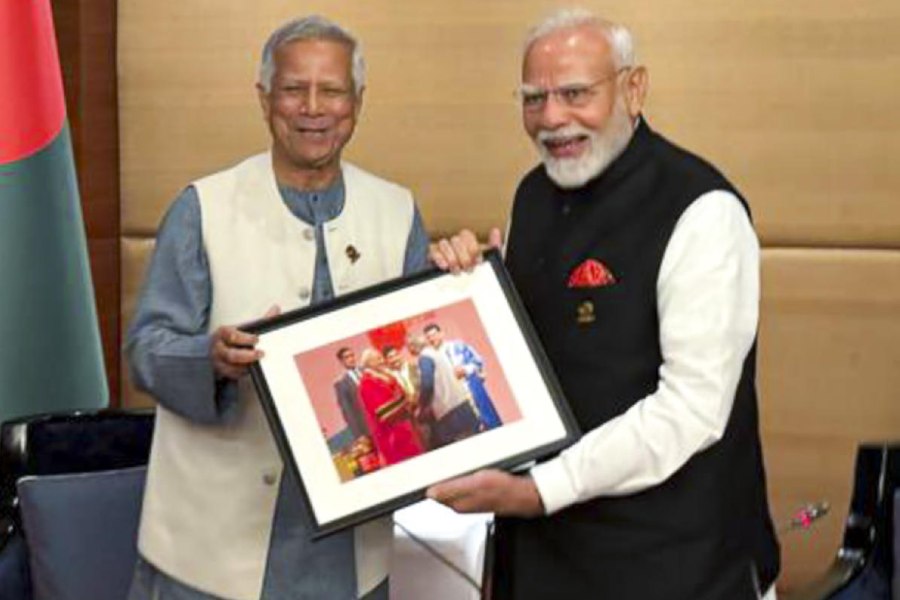Prime Minister Narendra Modi and Bangladesh chief adviser Muhammad Yunus had their much-awaited bilateral meeting in Bangkok on Friday, but the signals emerging from the two sides suggested there was no meeting of minds.
The frostiness in Dhaka-New Delhi ties was reflected in the divergent claims from the two sides on what was discussed in their first highest-level engagement since Sheikh Hasina’s ouster last August.
A media statement from the Bangladeshi side said Yunus had brought up the extradition of Hasina, who is in India, besides seeking Modi’s help to prevent her from making inflammatory media statements.
Yunus also raised other contentious issues — such as the sharing of the Teesta’s waters, renewal of the Ganga Treaty, and border killings — during the 30-minute meeting with Modi, Dhaka claimed.
India’s external affairs ministry said Modi had underlined New Delhi’s concerns about the safety of minorities, including Hindus, in Bangladesh besides expressing his expectation that Dhaka would ensure their security and investigate the atrocities committed against them.
Modi also conveyed to Yunus that any rhetoric that vitiates the environment is best avoided, the ministry added. This is being interpreted as New Delhi’s firmest rebuttal so far to Yunus’s recent statement in China that India’s northeast is “landlocked” and that Dhaka is the “only guardian of the ocean for all this region”.
External affairs minister S. Jaishankar had fired the first salvo at Yunus on Thursday, saying “cooperation is an integrated outlook, not one subject to cherry-picking”.
Jaishankar and national security adviser Ajit Doval were present at Modi’s meeting with Yunus on Friday, held on the sidelines of the
Bimstec summit.
Two sides differing on what was discussed at a bilateral meeting is not uncommon, but the scale of the divergence on Friday surprised a veteran Indian diplomat.
“It shows that there is a huge gap between the two sides.… The leaders did meet but the question is, was there a meeting of minds?” the former diplomat asked.
Multiple sources said that Modi was understood to have asked about the election roadmap in Bangladesh and conveyed his reservations about Yunus’s comment on the Northeast.
“The Bangladeshi side’s statement makes it clear that the interim government is trying to play to the gallery.… This is why they were so desperate for the meeting between our PM and Professor Yunus,” the veteran diplomat said, wondering whether holding a bilateral meeting on the sidelines of Bimstec was the right decision.
At least two other sources who have regular engagements with the external affairs ministry echoed the former diplomat, wondering why India had decided to engage with Yunus despite his comments in China.
“Meeting the chief adviser was a bad decision.… We have been maintaining from the beginning that the Yunus government is not legitimate and the scale and scope of engagement has therefore been restricted to the level of officials,” one of the sources said.
“The PM’s meeting gives this interim regime, which doesn’t have the mandate of the people, a kind of legitimacy.”
The other source dismissed the fairly popular theory that New Delhi had agreed to a dialogue to reduce the growing anti-India sentiments in Bangladesh.
“The Yunus regime and its main constituents are essentially anti-India,” this source said.
“They will use the pictures from the meeting and create a narrative to demoralise the Awami League, a traditional friend of India that is counting on India and the West to help it regain a toehold in the country’s political landscape, now usurped by
radical Islamists.”
The source added: “We have probably done an injustice to the secular, liberal and democratic forces in Bangladesh by engaging with Yunus at the level of our Prime Minister.”











